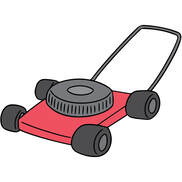 When mowing your lawn there are two ways you can handle your clippings. Mulching or catching. So what are these two methods and which way, if any, is better. Catching involves simply catching your mower clippings and disposing them, either in a green waste bin or perhaps using them for mulch in your gardens or using them to contribute to your compost. While we are discussing catching, let’s take a quick diversion on catcher styles. Catchers can be either plastic polymer or a mesh material. Many buyers are very sceptical of the mesh catchers, worried that they will tear, but the big advantage of a mesh catcher is the air flow, which allows your clippings to move easily from deck to chute to catcher. My personal experience with mesh catchers has been good, my 8 year old cheapy mower has a mesh catcher and has never missed a beat. The advantage to a plastic catcher is it is tear resistant. Anyway, back to the main article! Mulching means taking the catcher off, plugging the rear of your mower, either with the rear flap of your mower, or even better a proper mulch plug that will keep the clippings right underneath the deck and allow them to be chopped up finally. So why would you do one or the other? To Catch…
To Mulch…
Catching is also more appropriate if you have a problem with weeds. Mulching can cause the spread of weeds, keeping an eye on this and catching while treating weed problems can avoid the spread. Mulching can then be resumed once the weed problem is managed. Finally, you should catch if in colder climates or situations where clippings left behind do not decompose fast enough causing thatch. Mulching is more appropriate when you have a large lawn and do not want to be constantly stopping to empty your catcher. When you are regularly mowing your lawn and keeping its length down, mulching still gives you a really neat finish as the clippings left behind are short and manageable. The number one reason someone would mulch has to be nutrients and moisture. Mulching provides a huge amount of beneficial nutrients back into your lawn giving you a healthier lawn that will leave your neighbours “green” with envy. Schoormans, M. (2014). Mulch or catch lawn clippings? https://stratamow.com.au/blog/mulch-or-catch-lawn-clippings Spiers, L. (2003). Catching vs mulching. https://www.lawnandlandscape.com/article/catching-vs--mulching/ Jims Mowing. (2021). Should You Catch or Mulch When Mowing? https://www.jimsmowing.com.au/2021/04/should-you-catch-or-mulch-when-mowing/ Coates, C. (2017). Mulching vs. Bagging Grass Clippings: Which is best for my Idaho lawn? https://www.outbacklandscapeinc.com/blog/mulching-vs-bagging-grass-clipping Property Care. (2008). Lawn Mowing To Mulch or Catch. http://www.indmowing.com.au/forum/showthread.php?2251-Lawn-Mowing-To-mulch-or-catch
0 Comments
Leave a Reply. |
 RSS Feed
RSS Feed